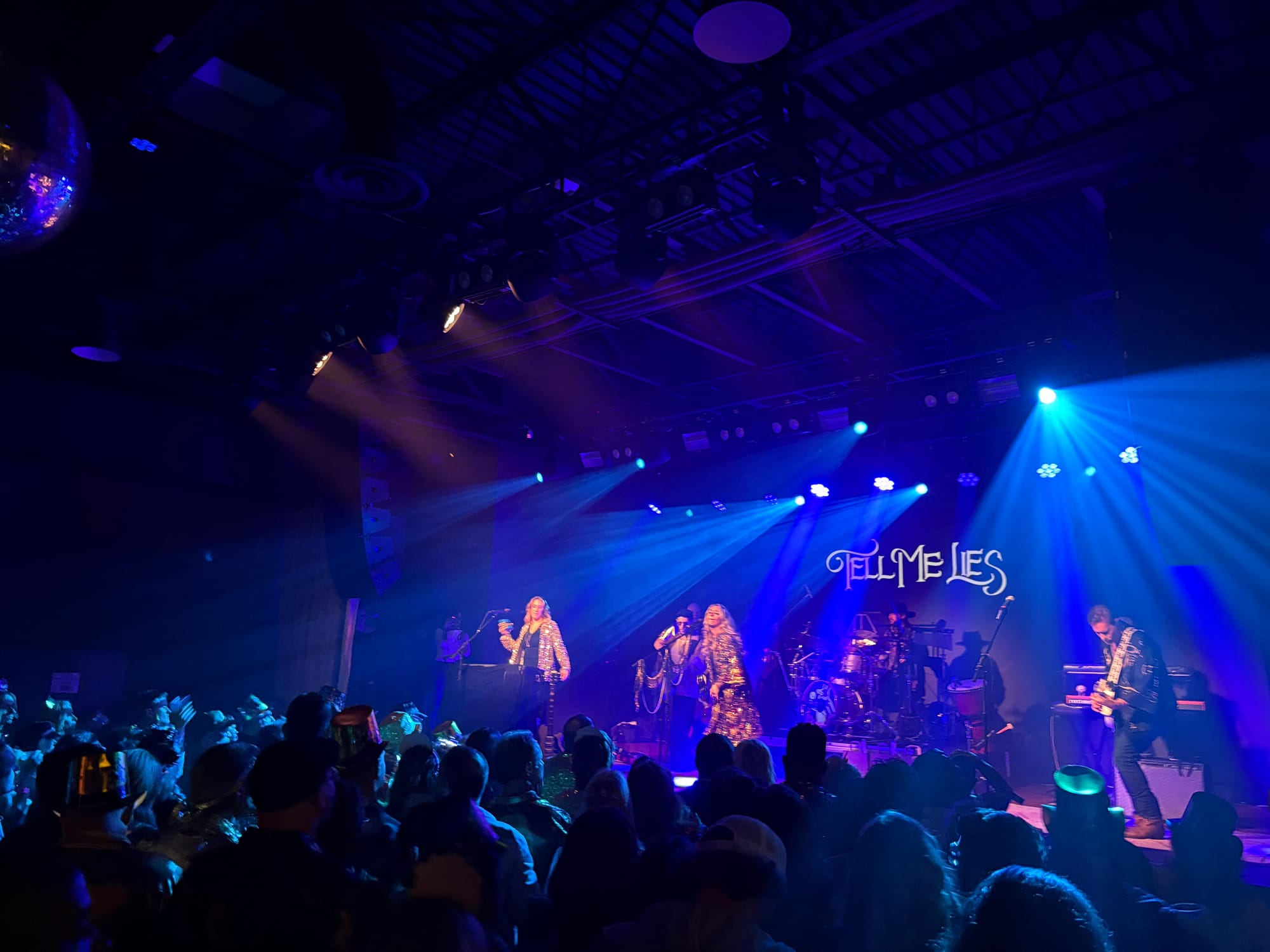Christine's last name was Perfect, until she married the bassist. You can look it up.
Fleetwood Mac’s Wikipedia entry is a truly wild ride, with a sprawling cast of characters, lots of substance abuse, mental health disorders, and Christian cults. There’s more litigation than I was expecting: for instance, there was a period of time in the early 1970s when the titular Mick Fleetwood and John “Mac” McVie were not able to record or tour under their own name. This is at least somewhat responsible for the group’s relocation from London to Southern California.
Tell Me Lies bills itself as “the most authentic & captivating Fleetwood Mac tribute in the Southeast,” which implies the existence of a sort of Fleetwood Mac credentialing organization. The classic Fleetwood Mac lineup had five members and Tell Me Lies has seven, but aside from that, this was the Mac that you’re thinking of: all scarves and tambourines and flowing blond locks and that funny little tiny guitar that Lindsey Buckingham would play and the big gong behind the drumset.
They took the stage of Chattanooga’s Barrelhouse Ballroom on New Year’s Eve at about 10:00 p.m. and opened with “Tusk,” an audacious, spectacularly strange song from the band’s decadent late 1970s era. The original recording includes a college marching band and Mick Fleetwood slapping a lamp chop with a spatula (look it up) and while tonight’s performance featured neither, they sounded great.

A group of girls near me are taking selfies with a digital camera (not, I notice, their iPhones.) I ask one of them why, of all the things she could be doing on New Year’s Eve in a big city like Chattanooga, she’s here, doing this.
“They’re my favorite band - it’s that simple,” she says, and for a second, I can’t tell if she’s talking about actual Fleetwood Mac or the ersatz Fleetwood Mac that’s on stage. Maybe she can’t either? “I’ve seen these guys here before. I’ve also seen the other band, from Atlanta? What are they called?”
“Rumors,” I volunteer. They also play Chattanooga quite a bit.
“Yeah!” she says. “They’re great.” Again, who is she talking about? It’s getting crowded and that’s all I’ll get. Even as she’s speaking to me, though, I can feel a mist of judgement creeping around the corners of my mind. Tell Me Lies’ on-stage chemistry is magnetic and their showmanship as performers is outstanding. They clearly know why they’re there, which is to entertain, and they do.
But are they a real band?
Does it matter? That’s the real question.
I have a theory that all bands are actually cover bands, in that they start out covering other people’s songs and end their careers covering their own. Look at the early records by the Beatles, the Rolling Stones, or Bob Dylan – all covers. In the folk tradition, writing new songs was essentially verboten; recording artists were curators and, interpreters, musical docents touring listeners through the Great Works. In the 1950s and early 60s, you’d no sooner write a new folk song than you’d write another book of the Gospel and try to preach it. (Bob Dylan changed all that; they even made a movie about it.)
In its earliest incarnation, Fleetwood Mac was the creative brainchild of a guitar player called Peter Green. Green may have named the group after his rhythm sections, but make no mistake: Fleetwood Mac was his band, and his band played authentic Delta and Chicago blues: Robert Johnson’s “Hellhound on My Trail,” Elmore James’ “Shake Your Moneymaker,” and Howlin’ Wolf’s “No Place To Go.”
Peter left the band; many lineup changes followed. Eventually Lindsey and Stevie joined up, Christine Perfect became Christine McVie, and something calling itself Fleetwood Mac romped through arenas and stadiums for close to five decades. That version is what Tell Me Lies depicts onstage.
Instagram tells me that lead singer’s name is Rachel Francis. She favors a young Stevie Nicks, I suppose, but only superficially. No matter - she’s a fine singer and tambourinist. Most of her bandmates inhabit some persona: Elizabeth Jones on keyboards plays and sings Christine’s parts while Brian Decker does the same for (as?) Lindsey Buckingham. Rachel’s husband Mike Francis is their Mick Fleetwood, all the way down to the fedora.

How did these people find themselves? How did they know this is what they wanted to do – that they’d be so good at it? What was the first Fleetwood Mac song any of them heard? Do they even like Fleetwood Mac anymore? Or is this now just kind of a job to do?
I did try to reach the band through their website, but I’ve not yet heard back. I hope I do at some point, but I get it - they’re a working band.
Earlier in the evening, a local band called the Essentials warmed us up with an hour of familiar hits that vacillated between classic hard rock and 90s-era alternative stuff. They were also very good but generated one of the more surreal live music moments of my life.
Near the end of their set, they play “Zombie,” by the Cranberries, which was written following a 1993 IRA bombing that killed two British children. This audience is bopping and grinning and waving their beers along to lines like “With their tanks and their bombs, and their bombs and their guns! In your head, in your head, they are dying!”
Is this what Dolores O'Riordan imagined for this song, this haunting, raging ode about violence and innocence and the senseless cruelty of generational conflicts? This is a song for candlelight vigils and marches in the street, no? Not New Year’s Eve parties in bars.
And yet: Delores is the one who made the song so damn good. She’s the one her put it on their album and played it on tour for years, hoping to bring its message to the masses. In a sense, it's her fault if the song's catchiness gave it a life that has since far outrun its original purpose - so what right do I have to stand there and get hung up on its meaning, 30 years later? On this night, this music was doing its job: we were all singing along, together, and the blend of our voices mattered more than the content of the lyrics.
I actually left the show before midnight. I didn’t get to hear them play “The Chain,” but that’s ok; I did get to hear my favorites: “Everywhere” and “Silver Spring.” On my way out the door, I glance at a poster for upcoming shows at Barrelhouse. They’ve got a half dozen other cover bands scheduled in the months ahead, interpreting everything from Pink Floyd to Bob Marley.
“You have to remember, when you’re talking about what makes a great band, the song itself is only one part of it,” my friend Karen will tell me later. She’s a terrific singer herself, but not a songwriter, and she makes great point.
What is a cover version anyway, if not a sort of scripture reading before our idols? We’re all drawn to mimic the behaviors of those we admire and adore. This is how children learn to become adolescents and then adults. It’s how teenage guitar players grow into masters. Homage is the path first to legitimacy, and then perhaps to transcendence.
And anyway, aren’t all live performances exercises in nostalgia salesmanship to some degree? How often am I going to see a band when I know none of their songs. What kind of nutcase would see a musician they loved, hoping to hear only new material?
The joy Tell Me Lies is selling is real, as is the smile on my face and the happiness everyone else here is feeling, including the band themselves. And as one long year slides into another, that’s good enough for me. Wherever Peter Green is, I hope he’s smiling too, and playing guitar with his idols and telling them about all of this. I’m sure they’d agree that anyone, doing anything to keep music alive, is worthwhile.
###